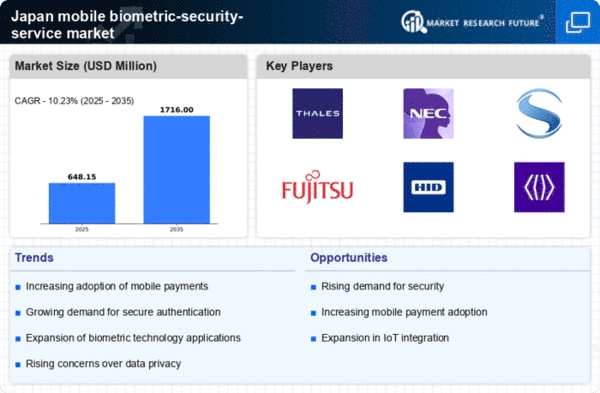Increasing Cybersecurity Threats
The mobile biometric-security-service market in Japan is experiencing growth due to the rising incidence of cybersecurity threats. As organizations face sophisticated cyber-attacks, the need for robust security measures becomes paramount. Biometric solutions, which offer unique identification methods such as fingerprint and facial recognition, are increasingly adopted to mitigate these risks. According to recent data, the market for biometric security solutions is projected to grow at a CAGR of 15% through 2027. This trend indicates a strong demand for mobile biometric services, as businesses seek to protect sensitive data and maintain customer trust. This market is thus positioned to benefit from this heightened focus on cybersecurity., as companies prioritize investments in advanced security technologies.
Rising Adoption of Mobile Devices
The proliferation of mobile devices in Japan is a key driver for the mobile biometric-security-service market. With an increasing number of consumers relying on smartphones and tablets for daily transactions, the demand for secure mobile applications is surging. Biometric authentication provides a convenient and secure method for users to access their devices and applications. Recent statistics show that mobile device penetration in Japan has reached approximately 90%, creating a substantial market for mobile biometric solutions. As businesses strive to enhance user experience while ensuring security, the mobile biometric-security-service market is likely to see continued growth, driven by the widespread adoption of mobile technology.
Government Initiatives and Support
The Japanese government is actively promoting the adoption of advanced security technologies, including mobile biometric solutions. Initiatives aimed at enhancing national security and public safety are driving investments in biometric systems. For instance, the government has allocated substantial funding to support research and development in biometric technologies. This support is likely to stimulate growth in the mobile biometric-security-service market, as public and private sectors collaborate to implement these solutions. Furthermore, the government's emphasis on digital transformation in various sectors, including finance and healthcare, is expected to increase the demand for mobile biometric services. As a result, the mobile biometric-security-service market is poised to expand significantly in response to these governmental efforts.
Consumer Preference for Enhanced Security
In Japan, there is a noticeable shift in consumer preferences towards enhanced security measures, particularly in mobile applications. As individuals become more aware of privacy concerns and data breaches, they are increasingly seeking services that offer biometric authentication. This trend is reflected in the growing adoption of mobile banking and e-commerce platforms that utilize biometric security features. Recent surveys indicate that over 60% of consumers prefer biometric authentication over traditional passwords, highlighting a clear demand for mobile biometric-security services. Consequently, businesses are compelled to integrate these solutions to meet consumer expectations, thereby driving growth in the mobile biometric-security-service market.
Technological Advancements in Biometric Systems
The mobile biometric-security-service market is significantly influenced by rapid technological advancements in biometric systems. Innovations such as artificial intelligence and machine learning are enhancing the accuracy and efficiency of biometric authentication methods. These advancements are making biometric solutions more accessible and user-friendly, which is likely to attract a broader customer base. For instance, the introduction of advanced facial recognition technology has improved the speed and reliability of mobile biometric services. As these technologies continue to evolve, they are expected to drive further adoption of mobile biometric solutions across various sectors, including finance, healthcare, and retail, thereby propelling the growth of the mobile biometric-security-service market.
















